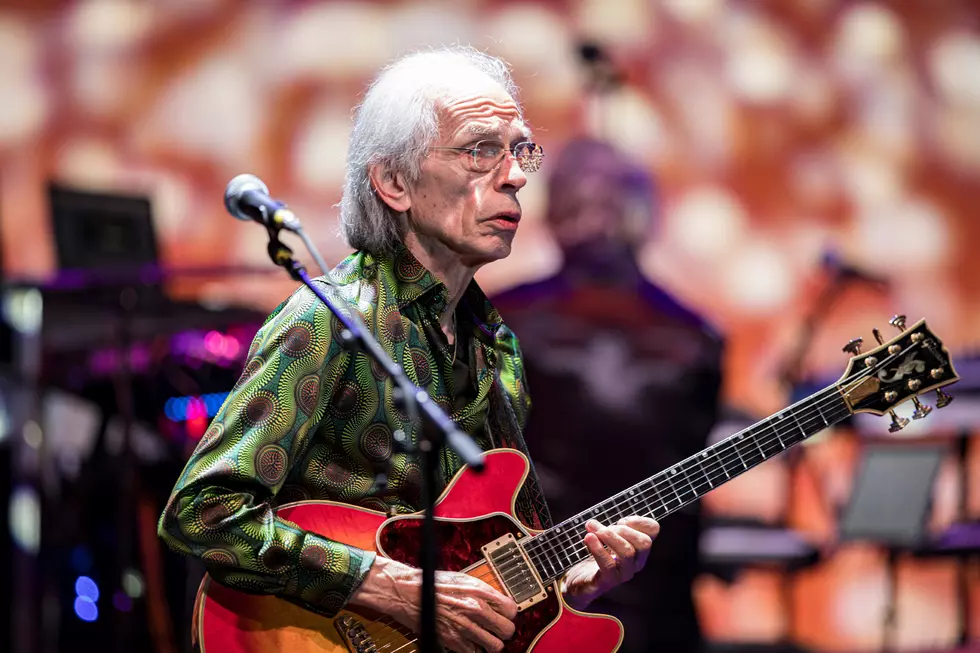
Rick Wakeman on Reuniting the ‘Holy Trinity of Yes': Exclusive Interview
A quarter century after they shared the stage as members of Yes on the Union tour, singer Jon Anderson, guitarist and singer Trevor Rabin and keyboardist Rick Wakeman are coming back together for a run of shows in the fall, an outing billed in an alphabetically democratic fashion as Anderson, Rabin & Wakeman.
As Wakeman tells Ultimate Classic Rock, there's a lot of excitement stirring around news of the collaboration, which he has labeled as the "Holy Trinity of Yes" -- and it's something that initially caught them a bit off guard.
“It leaked out, what we were going to do, as things always do,” he says. “But what stunned us all was the response that we got when it leaked out. I mean, all of our individual websites, Facebooks and Twitters and whatever, went absolutely crazy with so much warmth and love and support from the Yes fans everywhere. It really hit us hard, and we realized that what we wanted to do, was perhaps something that an awful lot of people wanted us to do as well. That played a massive part in us getting the tour together and making it happen.”
For the keyboard legend, the opportunity to tour with Anderson and Rabin helps to fill a musical gap that has been missing. “I haven’t had the opportunity to play with a proper band, with Yes or whatever, in America, since 2005," he notes. "It’s been 11 years, so I’m thrilled to be back doing it again. Because sometimes you wonder as the years go by, Will that ever happen again? American audiences are pretty special, so I’m really looking forward to it.”
The proposed collaboration had been brewing for several years, and Wakeman says that it was the 2015 death of "dear friend" Chris Squire that made them realize that they shouldn’t hold off on pursuing the idea. “I think it hit home to us all, certainly to me, that, ‘Hold on a minute, we’re not immortal,’” he explains. “Anything can happen almost overnight, and if there’s something that you want to do and you feel you have to do, you have to do it. You can’t say, ‘Well, when we’ve got a bit of time, we’ll do that.’ You’ve got to act on it. We all spoke to each other and went, ‘We’ve got to do this.’”
There has been talk of new music as part of the reunion, but Wakeman downplays that a bit, saying that they’re focused on the planning of the tour as their main priority presently. “Trevor, quite rightly, said ‘Hey guys, we’re not going to rush into all of this. This is nuts. It’s going to take us enough hard work to put a great show together.’" he recalls. "Yes, we can send music backwards and forwards and start working on bits and pieces, and maybe if we’ve got a couple of tracks ready to perform onstage or to do whatever, yeah, that would be great. If not, it’s not the end of the world, because we’ve got all of these months of working together and living in each other’s pockets. If we’re going to produce a full album, it’s got to be absolutely a cracking album. It’s got to be fantastic. So [we decided] not to rush into it, but just to make sure that when we do it, it’s really, really the right thing.”
Wakeman adds that there will be some "new bits and pieces" included. “One of the things that we want to do with the music is look at each of the tracks individually and look at the strengths and highlights of each of the tracks and try to take it to another level," he says. "We don’t want to do it as it was on the record or indeed, as Yes music has always sort of been played. We want to try and take it to another level. But we’re certainly not taking away all of the elements and the sound that the songs made.”
He also has his own thoughts as far as what he’d like to see on the set lists. “I’d like it to be a real mixture, obviously. I want to see everything from ‘Roundabout’ to ‘Owner of a Lonely Heart’ thrown in there and maybe ‘Changes,’ one of Trev’s great songs," he says. "I’d like to see some stuff in there from Fragile and from Going for the One, and there’s a couple of tracks on Tormato I wouldn’t mind seeing thrown in. But one of the difficulties is that we’ve got a plethora of music to choose from. I think the thing will be, How do we balance it out? How do we showcase the Yes music and showcase what we want to do with it? We’ve got two months where we’ll be sorting that all out. I think to some extent, it will start to take its own shape. The difficulty is that we’ve got such a massive choice of what to do.”
Longtime Yes associate Brian Lane, who's managed Wakeman for the past five years, was an important part of pulling the Anderson/Rabin/Wakeman union together. "I mentioned to him about Jon and Trevor, and Brian said, ‘You’ve got to make this happen,’" Wakeman recalls. "I said, ‘Look, you’ve got such a connection with Yes over the years. ... Why don’t you give them a ring and put forward your ideas about how you think it could come together and see what they say?’"
Despite some complications -- "You’ve got to get all of the musicians together," Wakeman notes -- the tour is falling into place. Wakeman says they're still working on who'll play drums and bass, as well as a secondary guitarist and keyboardist. Those additional members should be announced soon.
“You’ve got to look at all sorts of things," Wakeman points out. "I know this might sound really daft, but you’ve also got to look at the fact that between Trevor, Jon and myself, our ages total over 200 years. So it’s something that we have to look at very closely to go, ‘Hang on a minute, if we’re going to set about this solid two-month tour, we want to be really fit,’ because if you’re really fit, then you can play to your best and you can be really strong.
“We’re all very aware that we’ve got to make sure that we are really on the ball health-wise and musically and in every sense of the imagination," he continues. "It is easier when you get older to some extent, because you no longer want to go out clubbing after a show. You don’t want to wander back to the hotel at five in the morning, you know, wondering what your name is. I think you realize that you’ve got to look after yourself a bit, which actually isn’t a bad thing at all. There’s a lot more that has to be taken into consideration.”
If you’re worried Wakeman might downsize his touring setup thanks to new technology, there’s good news. “It will be a pretty big rig," he says. "The way my rig works, in the simplest terms, is that any instrument can play any other instrument at any time that I want. So I can actually move stuff around without physically moving the keyboards around. It’s quite a complex rig and it’s full of all of the sounds that I’ve created myself.”
Outside of the tour preparations, Wakeman has no shortage of other things going on. “It’s just ludicrously busy, and I like it that way. I work on the principle that if I’m busy, I can’t be dead,” he quips. He’ll release an updated take on his 1975 album The Myths and Legends of King Arthur and the Knights of the Round Table on June 19 and perform it live that same day at the O2 Arena in London. Wakeman performed the piece onstage only once before, in 1975.
Problem is, the promoters want a 90-minute show, and the original version is only 38 minutes. "So I revisited it, wrote a load of new material for King Arthur, which we recorded with orchestra, choir, band, everything," he says. "That’s taken nine months of unbelievable work and a lot of expense, but it’s come together brilliantly and I’m thrilled to bits with it.” Also on tap for Wakeman: a tribute to Stephen Hawking, and a London concert with new meditation music for piano and string orchestra for people with autism.
Like many other musicians, Wakeman was saddened by the death of David Bowie earlier this year, and reveals that their connection went far beyond the studio time that they shared. “I learned really how to work and behave in the studio, thanks to David,” he says. “It’s not really common knowledge that he and I were neighbors for five years. We both lived in Switzerland and we saw each other a lot. Some of the discussions that we had, and the talks we had about music, fashion and art, I loved the man because of his passion for what he did. He believed in music, he believed in art, he believed in fashion and he believed in himself. One of the things that he taught me, he said, “Be your own man.” He said, “By all means, listen to advice and other people, but don’t let other people tell you what to do.”
And you can’t argue the fact that he and Bowie definitely both stuck with that thought process. Wakeman says that ended up being pretty important advice. “I thank him for that, because he said, ‘Stick up for what you believe in,’" he says. "Things like Journey to the Centre of the Earth would never have been done, if I hadn’t stuck up for it. Because apart from my manager, the record company, the agents and all of the people around me said, ‘It won’t work, you can’t do it.’ So it was really thanks to David that I went, ‘No, I can do it!’
"And it wasn’t to do it to prove anybody wrong, although we did prove everybody wrong, it was done because I felt, if it’s going to succeed or fail, it has to do that on my terms," he concludes. "Not on anybody else’s.”
Yes Albums Ranked Worst to Best
More From Ultimate Classic Rock









